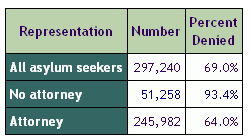Gonzales and Immigration: Reform or Smokescreen?
Yesterday (as reported in the NY Times, LA Times and elsewhere) Attorney General Alberto Gonzales issued a long-awaited review of the Immigration Courts and the Board of Immigration Appeals. Now, I'm jaded enough to worry whenever anyone in this administration talks about "reform" because what that usually means is "screw the people who are already getting screwed, just more discreetly." Even so, I found it interesting to peruse the 22 suggestions contained in the report. Below are just a few examples:
Requiring immigration judges to actually demonstrate that they know something about immigration law? What a revolutionary concept! Now if only we could require our presidents to know something about the constitution...
 I'd say that this reform is way overdue, when you consider that having an attorney greatly improves an applicant's chances of being granted asylum. (As seen in the table at right, asylum is denied 93% of the time if there's no attorney, but only 64% of the time if there is.)
I'd say that this reform is way overdue, when you consider that having an attorney greatly improves an applicant's chances of being granted asylum. (As seen in the table at right, asylum is denied 93% of the time if there's no attorney, but only 64% of the time if there is.)
And speaking of asylum, this is my personal favorite...
I'm sure it's entirely coincidental that this report came out just 10 days after the TRAC report on Immigration Judges to which this item clearly refers.
There's a lot more in there, and as I'm not an immigration policy expert, I'll leave it to others to comment about whether or not this represents a serious effort at real reform or just more smoke and mirrors. What I feel is important, however, is that this administration is clearly scrambling to do damage control on what was supposed to have been a no-brainer Republican "divide and conquer" campaign strategy. By continuing to hammer on this issue, I hope that progressives can blunt the power of conservative xenophobia.
3. Examination on Immigration Law
Immigration judges and Board members should be proficient in the principles of immigration law. To ensure that is true, all immigration judges and Board members appointed after December 31, 2006, will have to pass a written examination demonstrating familiarity with key principles of immigration law before they begin to adjudicate matters. The Director of EOIR will develop such an immigration law exam and submit it to the Deputy Attorney General. The Director may consider the appropriateness of a training course prior to the administration of the examination.
Requiring immigration judges to actually demonstrate that they know something about immigration law? What a revolutionary concept! Now if only we could require our presidents to know something about the constitution...
22. Expanded and Improved EOIR-sponsored Pro Bono Programs
The Director of EOIR will consider forming a committee to oversee the expansion and improvement of EOIR's pro bono programs. Such a committee will be composed of immigration judges, representatives of the Board, other EOIR personnel, representatives of the Department of Homeland Security and the private immigration bar, and any other participants whom the Director deems necessary.
 I'd say that this reform is way overdue, when you consider that having an attorney greatly improves an applicant's chances of being granted asylum. (As seen in the table at right, asylum is denied 93% of the time if there's no attorney, but only 64% of the time if there is.)
I'd say that this reform is way overdue, when you consider that having an attorney greatly improves an applicant's chances of being granted asylum. (As seen in the table at right, asylum is denied 93% of the time if there's no attorney, but only 64% of the time if there is.) And speaking of asylum, this is my personal favorite...
8. Analysis and Recommendations Regarding Disparities in Asylum Grant Rates
A recent study has highlighted apparent disparities among immigration judges in asylum grant rates. The Director of EOIR, in consultation with the Acting Chief Immigration Judge, will review this study and provide an analysis and, if appropriate, recommendations to the Deputy Attorney General with respect to this issue.
I'm sure it's entirely coincidental that this report came out just 10 days after the TRAC report on Immigration Judges to which this item clearly refers.
There's a lot more in there, and as I'm not an immigration policy expert, I'll leave it to others to comment about whether or not this represents a serious effort at real reform or just more smoke and mirrors. What I feel is important, however, is that this administration is clearly scrambling to do damage control on what was supposed to have been a no-brainer Republican "divide and conquer" campaign strategy. By continuing to hammer on this issue, I hope that progressives can blunt the power of conservative xenophobia.


